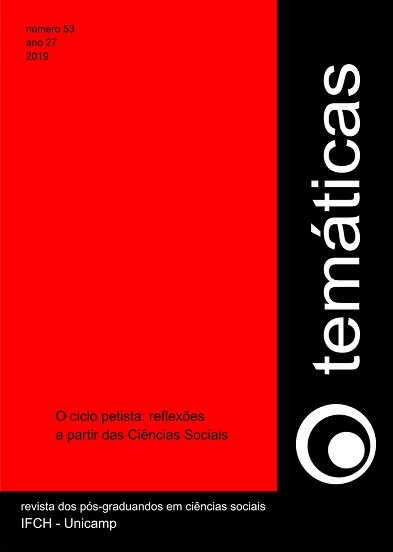Abstract
The impeachment process of former President Dilma Rousseff (PT) and the political uncertainties for the coming years have rescued the debate on the Brazilian institutional design, especially regarding the Executive-Legislative relationship and the cost that the Executive would have to approve its agenda in front of the Legislature. For some, the mix between presidentialism and multi-party system leads to a difficult equation dilemma. Others point to the capacity of the Brazilian institutional arrangement to produce decisions through mechanisms of cooperation and conflict resolution. The debate, therefore, remains open. The purpose of this article is to feed the discussions on the executive agenda through a study of the legislative proposals initiated by Dilma Rousseff’s administration between January 2011 and May 11, 2016 (the removal of the former president happened on 12 May). We analyzed 341 proposals, distributed in: Provisional Measures (MPV), Constitutional Amendment Proposals (PEC), Law Projects (PL) and Complementary Law Projects (PLP). We also take into account the nature of the propositions, the success rate, the processing time and the use of the presidential veto.
References
ABRANCHES, Sérgio. Presidencialismo de Coalizão: o dilema institucional brasileiro. DADOS- Revista de Ciências Sociais, v. 31, n. 1, p. 5-34, 1988.
ABRANCHES, Sérgio. Presidencialismo de coalizão: raízes e evolução do modelo político brasileiro. São Paulo: Companhia das Letras, 2018.
ALBALA, Adrian. Presidencialismo y Coaliciones de Gobierno en América Latina: un análisis del papel de las instituciones. Revista de Ciencia Política, v. 36, n. 2, p. 459-479, 2016.
AMORIM NETO, Octavio. Presidencialismo e governabilidade nas Américas. Rio de Janeiro: Ed. FGV; Konrad Adenauer Stiftung, 2006.
ANASTASIA, Fátima, MELO, Carlos Ranulfo e SANTOS, Fabiano.Governabilidade e Representação Política na América do Sul. Rio de Janeiro: Konrad Adenauer; São Paulo: Ed. UNESP, 2004.
COELHO, Andre. Inestabilidad política y caídas presidenciales en Sudamérica: causas y consecuencias. Política, v. 50, n. 1, p. 167-194, 2012.
COX, Gary. The organization of democratic legislatures. In: WITTMAN, Donald; WEINGAST, Barry. The Oxford Handbook of Political Economy. Oxford: Oxford University Press, 2006.
FIGUEIREDO, Argelina; CANELLO, Júlio; VIEIRA, Marcelo. Governos Minoritários no Presidencialismo Latino-Americano: determinantes institucionais e políticos. Dados - Revista de Ciências Sociais, v. 55, n. 4, p. 839-875, 2012.
FIGUEIREDO, Argelina; LIMONGI, Fernando. Executivo e legislativo na nova ordem constitucional. São Paulo: Ed. FGV, 1999.
FIGUEIREDO, Argelina. Poder de agenda na democracia brasileira: desempenho do governo no presidencialismo no presidencialismo pluripartidário. In: SOARES, Gláucio; RENNO, Lúcio (Ed.). Reforma política: lições da historia recente. Rio de Janeiro: Ed. FGV, 2006. p. 249-280.
FIGUEIREDO, Argelina. Instituições políticas e governabilidade: desempenho do governo e apoio legislativo na democracia brasileira. In: MELO, Carlos Ranulfo; SAEZ, Manuel Alcantara. A democracia brasileira: balanço e perspectivas para o século XXI. Belo Horizonte: Ed. UFMG, p. 147-198, 2007.
FREITAS, Andréa. O presidencialismo da coalizão. Rio de Janeiro: Fundação Konrad Adenauer, 2016.
KINGDON, John W. Agendas, alternatives, and public policies. Boston: Little Brown, 1984.
LANZARO, Jorge. Tipo de presidencialismo y coaliciones políticas en América Latina. Buenos Aires: CLACSO, 2001.
LIMONGI, Fernando; FIGUEIREDO, Argelina. Bases institucionais do presidencialismo de coalizão. Lua Nova: Revista de Cultura e Política, n. 44, p. 81-105, 1998.
LIMONGI, Fernando; FIGUEIREDO, Argelina. A crise atual e o debate institucional. Novos Estudos CEBRAP, v.36, n.3, p. 79-97, 2017.
LINZ, Juan; VALENZUELA, Arturo. Las crisis del presidencialismo. Madrid: Alianza Editorial, 1998.
MAINWARING, Scott; SHUGART, Matthew S. Presidencialism and democracy in Latin America. Cambridge: Cambridge University Press, 1997.
PEREIRA, Carlos; POWER, Timothy J.; RENNÓ, Lúcio. Under what conditions do presidents resort to decree power? theory and evidence from the Brazilian case. Journal of Politics, v. 67, n. 1, p. 178-200, 2005.
PÉREZ-LIÑÁN, Aníbal. Instituciones, coaliciones callejeras e inestabilidad política: perspectivas teóricas sobre las crisis presidenciales. América Latina Hoy, n. 49, p. 105-126, 2008.
POWER, Timothy. J. Presidencialismo de coalizão e o design institucional no Brasil: o que sabemos até agora? In: SATHLER, André; BRAGA, Ricardo. Legislativo pós-1988: reflexões e perspectivas. Brasília: Câmara dos Deputados, 2015, p. 15-46.
RAILE, Eric; PEREIRA, Carlos; POWER, Timothy J. Presidencialismo de coalizão e recompensas paralelas: explicando o escândalo do mensalão. In: INÁCIO, Magna; RENNÓ, Lúcio. Legislativo brasileiro em perspectiva comparada. Belo Horizonte: Ed. UFMG, 2010, p. 207-234.
SANTOS, Fabiano. O Poder Legislativo no presidencialismo de coalizão. Belo Horizonte: Ed. UFMG, 2003.
SANTOS, Fabiano. Em defesa do presidencialismo de coalizão. In: SOARES, Gláucio; RENNÓ, Lúcio. Reforma política: lições da história recente. Rio de Janeiro: Ed. FGV, 2006, p. 281-295.
SANTOS, Fabiano; BORGES, Mariana. Poder de agenda. Brasília: ENAP, 2018.
SANTOS, Manoel Leonardo; PÉREZ-LIÑÁN, Aníbal; GARCÍA MONTERO, Mercedes. El control presidencial de la agenda legislativa en América Latina. Revista de Ciencia Política, v. 34, n. 3, p. 511-536, 2014.
SHEPSLE, Kenneth A.; WEINGAST, Barry R. The institutional foundations of committee power. American Political Science Review, n. 81, p. 85-103, 1987.
VALENZUELA, Arturo. Presidencias latinoamericanas interrumpidas. América Latina Hoy, n. 49, p. 15-30, 2008.
WEINGAST, Barry R.; MARSHALL, William J. The industrial organization of Congress. Journal of Political Economy, n. 96, p. 132-163, 1988.

This work is licensed under a Creative Commons Attribution-NonCommercial-ShareAlike 4.0 International License.
Copyright (c) 2019 Bruno de Castro Rubiatti, Fabiano da Silva Pereira

